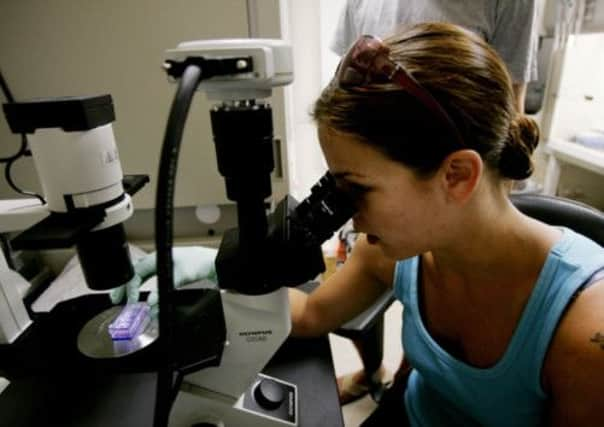Alzheimer’s pill ‘is ten years away’


A landmark British study found that the treatment was successful in halting the death of neurons – a type of nerve cell in the brain – in mice.
While the research is still at an early stage – at least ten years away from being available for use in humans – experts said the findings were hugely significant.
Advertisement
Hide AdAdvertisement
Hide AdThe Medical Research Council (MRC) team in Leicester focused on the root cause of many degenerative diseases such as Alzheimer’s and Parkinson’s – abnormally shaped proteins that stick together in clumps in the brain.
When enough misshapen protein builds up in the brain, it can trigger a reaction that results in the death of nerve cells.
While other approaches have sought to stop or limit the accumulation of the abnormal proteins, the MRC researchers targeted the harmful way brain cells react to misshapen proteins.
Using a drug injected into the stomachs of mice with prion disease – a condition that affects the brain and nervous system – they succeeded in preventing neurons from dying.
Five weeks after treatment, one group of mice remained free of symptoms such as memory loss, impaired reflexes and limb dragging. They also lived longer than untreated animals with the same brain disease.
The scientists stressed human trials were a long way off and pointed out that the mice suffered serious side-effects, including significant weight loss and raised blood sugar.
But they also believe the research demonstrates in principle the possibility of developing an oral treatment that can protect the brain from neurodegenerative disease.
Lead scientist Professor Giovanna Mallucci, from the MRC toxicology unit at the University of Leicester, said: “We’re still a long way from a usable drug for humans.
Advertisement
Hide AdAdvertisement
Hide Ad“But the fact that we have established that this pathway can be manipulated to protect against brain cell loss means that developing drug treatments targeting this pathway for neurodegenerative diseases is now a real possibility.”
Commenting on the research, Professor Roger Morris, from the Department of Chemistry at King’s College London, said: “True, this study has been done in mice, not man; and it is prion disease, not Alzheimer’s, that has been cured. However, there is considerable evidence that the way neurons die in both diseases is similar, and lessons learned in mice from prion disease have proved accurate guides to attenuate the progress of Alzheimer’s disease.”
He added: “This finding, I suspect, will be judged by history as a turning point in the search for medicines to control and prevent Alzheimer’s disease.”
A spokeswoman for Alzheimer’s Scotland said: “These are very encouraging results for a drug treatment that could, potentially, benefit people with a variety of brain degenerative conditions. However, these trials are clearly still at a very early stage.”